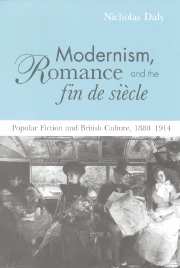Book contents
- Frontmatter
- Contents
- Acknowledgements
- Introduction
- 1 Incorporated bodies: Dracula and professionalism
- 2 The imperial treasure hunt: The Snake's Pass and the limits of romance
- 3 ‘Mummie is become merchandise’: the mummy story as commodity theory
- 4 Across the great divide: modernism, popular fiction and the primitive
- Afterword: the long goodbye
- Notes
- Index
1 - Incorporated bodies: Dracula and professionalism
Published online by Cambridge University Press: 23 November 2009
- Frontmatter
- Contents
- Acknowledgements
- Introduction
- 1 Incorporated bodies: Dracula and professionalism
- 2 The imperial treasure hunt: The Snake's Pass and the limits of romance
- 3 ‘Mummie is become merchandise’: the mummy story as commodity theory
- 4 Across the great divide: modernism, popular fiction and the primitive
- Afterword: the long goodbye
- Notes
- Index
Summary
The dinner was very long, and the conversation was about the aristocracy – and Blood. Mrs Waterbrook repeatedly told us that if she had a weakness, it was Blood.
David CopperfieldIn the romances of the fin de siècle we have tended to see a literature of anxiety symptomatic of some more general cultural crisis. The monstrous anachronisms of such novels as She, Dracula and Dr Jekyll and Mr Hyde consequently seem to mirror a whole set of anxieties: the collapse of empire, the degeneration of the race in the light of evolutionary theory, and the rise of the New Woman, to name but a few. These are indeed anxious texts, but I want to argue that they may produce and manage anxiety as well as express it. In this chapter I will give an account of the way one of these romances, Bram Stoker's Dracula, uses anxiety to produce as both necessary and natural a modern form of professional, male, homosocial combination – the team of experts. I will also be advocating a reconsideration of the fin de siècle as a period of crisis. Despite an increasingly shrill rhetoric of decline, Britain was in fact far from collapse. On the contrary, the British empire grew dramatically during this period, while at home state power was also undergoing a phase of expansion. This latter phenomenon depended on the existence of a new class of experts, and the adventure romance played a part in the formation of this professional class.
- Type
- Chapter
- Information
- Modernism, Romance and the Fin de SièclePopular Fiction and British Culture, pp. 30 - 52Publisher: Cambridge University PressPrint publication year: 2000



